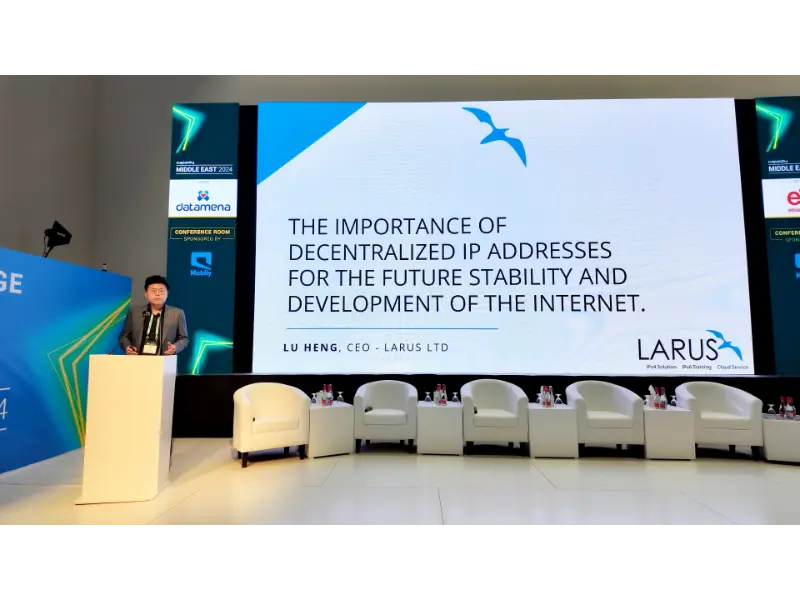- Lu Heng, CEO at LARUS Ltd, has given an impassioned speech at a recent tech conference, promoting the decentralization of IP addresses.
- Lu said the legacy way of allowing Regional Internet Registries to control the IP address ecosystem was outdated, non-democratic and even dangerous.
- Decentralised IP address allocation with technologies such as blockchain will not only help to improve the Internet environment, but also benefit sovereign countries, Lu said.
LARUS Ltd CEO Lu Heng made a splash at the recent Capacity Middle East event in Dubai, when he gave an impassioned speech advocating for the decentralisation of the IP address ecosystem.
Claiming the current system, where the Regional Internet Registries control the allocation and registration of IP addresses, is outdated and even dangerous, he said moving IP address ownership onto the blockchain is a far more egalitarian and risk-free way of managing this essential part of the internet.
You can see his speech in the video, and read more details about his ideas below the video.
The importance of decentralization
Heng Lu, Founder and CEO of LARUS Ltd, stressed at the conference that the nature of IP addresses as an essential part of telecommunications infrastructure, means their saftey and security is paramount. At the moment, those cannot be assured, he said.
Why is decentralization important? For them, no regulation; for us, no protection, he added.
Currently, there are five virtually unregulated private organisations, RIPE NCC, ARIN, LACNIC, AFRINIC, APNIC, which call themselves “Regional Internet Registries” while also having the right to register and change registered IP addresses.
Lu claims that their control over the IP address market is outdated and risky.
What are IP addresses?
While we all use IP addresses every day with our devices connected to the internet, the IP address assigned to you is not actually your property. They can be removed by foreign private companies, and many sovereign corporations and national telecommunications companies are not aware of these policies.
This threat will continue as long as our resources are determined by private foreign companies, said Lu. This has direct implications for the viability, profitability and valuation of Internet stability and national security in each country. Important Internet resources are managed by several organisations divided by region, resulting in such things as lack of censorship, being manipulated, abuse of power.
IP addresses are not private property, as long as our resources are decided by foreign private companies, this has a direct impact on the Internet stability and national security of every country.
What are Regional Internet Registries?
- RIPE NCC & ARIN: RIPE NCC and ARIN in North America, as functional RIRs, set a good example for the operation of Regional Internet registries (RIRs). However, there is no guarantee that these RIRs will continue to operate in the future and not be affected by the corruption we have seen elsewhere.
- APNIC: APNIC, the Asia-Pacific region’s Internet registry, has been controlled for the past 20 years by one man – Paul Wilson – through a private company in Australia. “This is totally unacceptable,” Lu said. Things slowly began to change. However, there is still so much to be done in terms of giving members their IP ownership rights, turning the organisation’s structure from top-down to bottom-up, being truly led by community members and away from the old centralised model.
- AFRINIC: The RIR for Africa has been beset by problems over the past two years: corruption and unprofessionalism by administrators, abuse of power and theft of network resources, black market sales, increase of membership fees for no reason. Despite the provisions of the Mauritian Court, it is currently being pushed by an unknown group of people. AFRINIC currently has no chief executive or any legitimate board. The date of the much-needed elections is still unclear.
What else?
Lu pointed to other problems in the current RIR system as needing change:
- Political struggles and other aspects of human nature interfering with transparent and efficient functioning.
- The current system requires consensus, which often means the minority must obey the majority.
- There are limited rights to resource members to speak out.

Lu Heng’s vision for a decentralised internet
Lu said that while the current system worked well for the past 30 years, it has become outdated, and with the chance to upgrade, using improved technologies such as blockchain, not to do so should be considered neglect of this essential global utility.
Also read: A game-changing partnership unveiled: LARUS & CMI sign MOU
What should it look like?
TRANSPARENCY
RIRs should welcome scrutiny, whether from the community or the judiciary, rather than complaining about it. They should be open to communication clarity and be open to questions and recommendations for the overall organization development.
ACCOUNTABILITY
Attacking critics is not the solution as it only aggravates the issues. The RIRs should be more accountable for their duties and responsibilities, and include members in their decision-making and policy-change.
UNITY
RIRs should start putting more focus on unity and inclusion between the organization itself and its members. Both parties can work together to drive their development and success to higher extensions.

